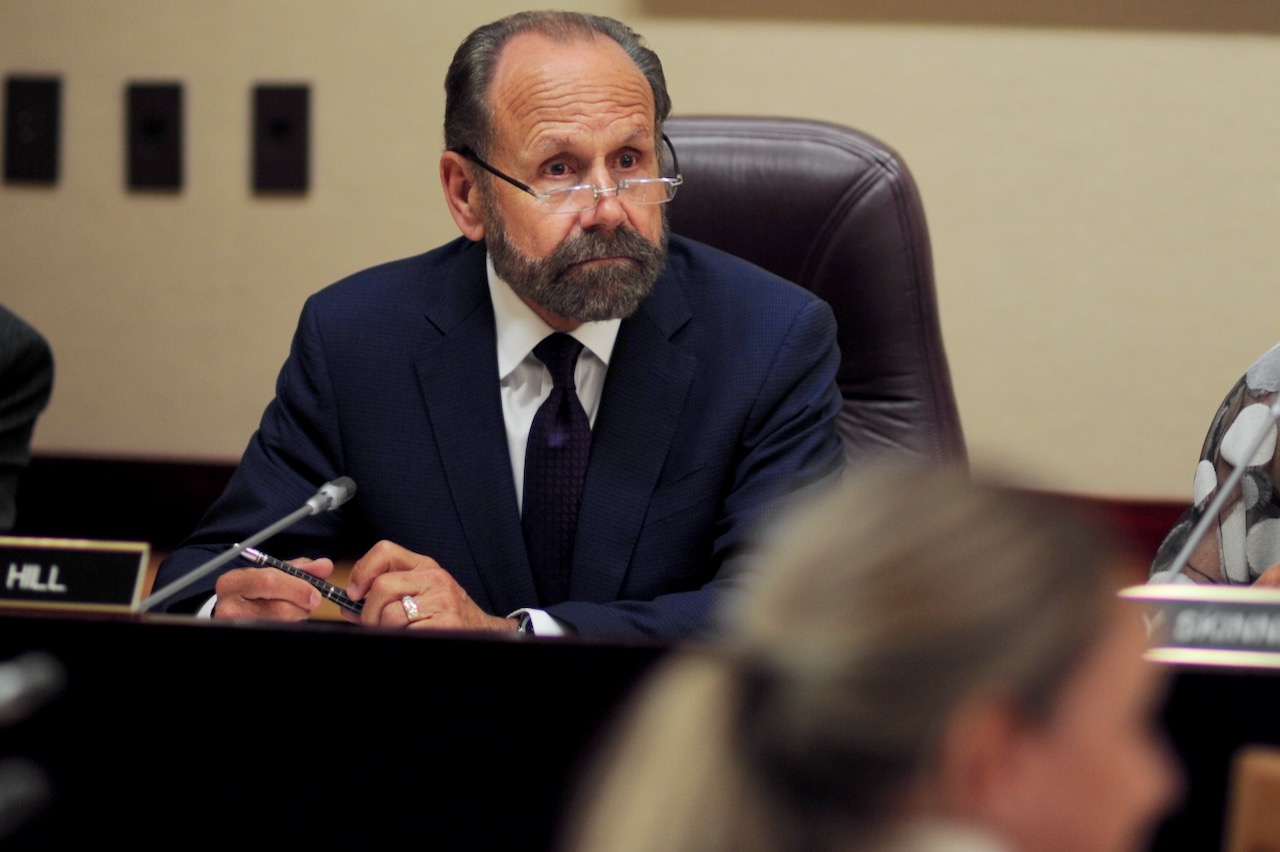
CalChamber New Laws 2020. (Calchamber.com)
California Chamber and Other Biz Groups Sue Over Employment Arbitration Ban
Businesses in California face a genuine threat of civil and criminal enforcement of the new law’s provisions
By Chris Micheli, December 20, 2019 12:02 pm
AB 51 makes it a crime for businesses to exercise their federally protected rights
The U.S. and California Chambers of Commerce, along with several other business trade groups, filed a lawsuit against State of California officials to overturn the enactment of AB 51 by Assemblywoman Lorena Gonzalez (D-San Diego), which Governor Gavin Newsom signed in October.
The purpose of AB 51 is to substantially limit the use of mandatory arbitration agreements in employment disputes.
The business trade associations make a number of arguments in their effort to preclude the imposition of AB 51, which is scheduled to take effect on January 1. For example, their member companies rely on arbitration agreements with their workers so that all parties have access to the benefits of arbitration. They also explain in detail how the California Legislature has repeatedly sought to restrict employment arbitration practices in this state.
As a result of the enactment of AB 51, businesses in California face a genuine threat of civil and criminal enforcement of the new law’s provisions. In their lawsuit filed in federal district court in Sacramento, the business groups argue that they are likely to succeed on the merits of the lawsuit, and that they will suffer imminent, irreparable harm if a preliminary injunction is not issued by the federal court.
By way of background, Congress enacted the Federal Arbitration Act (FAA), found at 9 U.S.C. §§ 1-16, to “promote arbitration.” The Supreme Court has repeatedly held that the FAA preempts state substantive or procedural rules that forbid or undermine agreements to arbitrate in the labor and employment context or in any other setting within the federal statute’s scope. Despite these numerous decisions against similar state laws, California enacted AB 51 with the intent of limiting businesses and workers from agreeing to arbitrate all Labor Code and Fair Employment and Housing Act claims.
To make matters worse, AB 51 makes it a crime for businesses to exercise their federally protected rights to present workers with agreements to arbitrate those claims on or after January 1, 2020. And, AB 51 treats an arbitration agreement as mandatory—and thus unlawful—even if a worker has the opportunity to opt out of it.
As the lawsuit explains, California businesses have long used arbitration to provide fair, quick, and efficient resolution of workplace disputes while reducing the burdens to all parties of litigation in court. Some businesses condition employment or the provision of work on an agreement with their employees to arbitrate, while others permit workers to opt out of arbitration. Unfortunately, all of these businesses face harsh sanctions, including criminal penalties, if they continue these practices on or after January 1.
The business trade associations argue that the federal district court should issue the requested injunction to preclude the law’s enforcement because the businesses believe AB 51 is preempted by the FAA and therefore invalid under the Supremacy Clause of the U.S. Constitution. AB 51 improperly “impede[s] the ability of” employers “to enter into arbitration agreements,” and therefore is preempted. This was the basis for Governor Brown’s veto of a nearly identical bill just one year ago (AB 3080, Gonzalez).
While the author and proponents of AB 51 argued that the new law would not be preempted because it regulates the formation of arbitration agreements rather than the enforceability of those agreements once formed, the United States Supreme Court’s decision in Kindred Nursing Homes squarely forecloses that theory. As Justice Kagan explained for the Court, the FAA protects against not only discriminatory rules regarding the enforcement of arbitration agreements, but also rules “governing what it takes to enter into them.”
None of the arguments that were raised against preemption in the California Legislature by the proponents of AB 51 withstand judicial scrutiny.
Businesses and workers who are forced into resolving their disputes through litigation in court—often after administrative adjudication—until this lawsuit is resolved would lose the benefits of arbitration. And those members who do not comply with AB 51, based on the good-faith belief that the FAA protects arbitration agreements, risk unprecedented sanctions, including criminal liability.
Businesses in this state believe it is important that all employees be treated the same; however, with the prospective application of AB 51, employees in the same workforce will have arbitration agreements while others will not. Arbitration has long been deemed to be faster, simpler, cheaper, and less adversarial as a mode of dispute resolution in comparison to litigation. Even the Supreme Court has recognized “real benefits to the enforcement of arbitration agreements” in the employment context.
More than 30 years ago, the U.S. Supreme Court held that the FAA preempted a California Labor Code provision requiring that wage collection actions be resolved in court “without regard to the existence of any private agreement to arbitrate.” The Court concluded that prohibiting arbitration of wage disputes was in “unmistakable conflict” with the FAA, so that, “under the Supremacy Clause, the state statute must give way.”
Furthermore, AB 51’s special restrictions on the ability of businesses to enter into arbitration agreements with their workers, especially coupled with the extraordinary sanction of criminal penalties—restrictions and penalties that do not apply to other types of contracts—violate Section 2 of the FAA.
The U.S. Supreme recently held, a “rule that “singles out arbitration provisions for suspect status” in this manner “directly conflicts with § 2 of the FAA.”
The business groups also argue that none of the arguments that were raised against preemption in the California Legislature by the proponents of AB 51 withstand judicial scrutiny. That is due to U.S. Supreme Court precedent which forecloses the contention that AB 51 avoids preemption because “its edicts would apply equally to waiver of any dispute resolution forum or procedure.” Ironically, the Senate and Assembly Floor analyses for AB 51 underscore that the measure is specifically targeted to preclude the use of arbitration agreements as a condition of employment.
As mentioned, the Supreme Court’s decision in Kindred Nursing Homes also squarely repudiates the assertion by AB 51’s proponents that “[t]he Supreme Court has never ruled that the FAA applies in the absence of a valid agreement.” In fact, the Supreme Court has made clear that the FAA’s “equal footing principle” applies not only to the enforcement of arbitration agreements once formed, but also to “what it takes to enter into them.”
And, this result is not altered by the language that was belatedly added to AB 51, stating that the statute is not “intended to invalidate a written arbitration agreement that is otherwise enforceable under the Federal Arbitration Act.” Regardless of whether an arbitration agreement governed by the FAA is valid once formed, AB 51 penalizes employers—with potential criminal liability—for forming an arbitration agreement in the first place.
The business groups also note that their member companies are likely to experience a spike in the filing of meritless lawsuits, as some members of the plaintiffs’ bar may try to leverage the sudden increase in employers’ defense costs to obtain windfall settlements for baseless claims that would never have been filed in arbitration.
These associations also cited reasons why arbitration provides workers with a fair and effective means of resolving disputes: The procedures in arbitration are fair; the forum offers workers simple procedures that can be navigated without a lawyer; the court system is long delayed by overcrowded dockets; without arbitration, many workers would not have any meaningful remedy; and, arbitration is faster than court litigation.
Ironically, it was back in 1987 that the U.S. Supreme Court first struck down a California statute on FAA preemption grounds. The Court ruled that a Labor Code provision (which attempted to require certain disputes be only submitted to the Labor Commissioner) that disfavors arbitration is preempted by federal law.
More recently, the U.S. Supreme Court has explained that the FAA preempts both any state rule that “discriminates on its face against arbitration” along with any rule “that covertly accomplishes the same objective by disfavoring contracts that . . . have the defining features of arbitration agreements.”
The goal of this federal lawsuit against AB 51 is to declare the bill is preempted by the Federal Arbitration Act and therefore invalid as applied to arbitration agreements or, in the alternative, that the text of AB 51 itself precludes application of the statute to formation and enforcement of arbitration agreements that are covered by the FAA.
The business groups also seek to enjoin the State of California and its officials from enforcing AB 51. A preliminary ruling is expected in January.
The business groups also note that their member companies are likely to experience a spike in the filing of meritless lawsuits, as some members of the plaintiffs’ bar may try to leverage the sudden increase in employers’ defense costs to obtain windfall settlements for baseless claims that would never have been filed in arbitration.
- Regulatory Powers of the Fish and Game Commission - March 2, 2026
- Committee Versus Floor Lobbying - March 1, 2026
- Fishing Traps in California - March 1, 2026





Winston Churchill said:
—“Some people regard private enterprise as a predatory tiger to be shot. Others look on it as a cow they can milk. Not enough people see it as a healthy horse, pulling a sturdy wagon.”
The #DemParty can’t decide whether private enterprise is a tiger or cow.
In any event, the Dem CA legislature should charge Texas for helping to boost business and jobs in Texas.